
-
 Conservatives win German vote as far-right makes record gains
Conservatives win German vote as far-right makes record gains
-
'Captain America' slips but clings to N. America box office lead

-
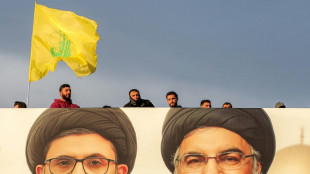 Tens of thousands vow support for Lebanon's Hezbollah at slain leader's funeral
Tens of thousands vow support for Lebanon's Hezbollah at slain leader's funeral
-
Tens of thousands pour in for Beirut funeral of slain Hezbollah leader
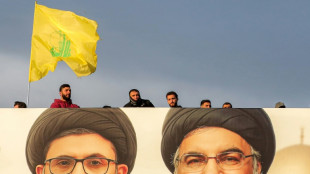
-
 Germans vote under shadow of far-right surge, Trump
Germans vote under shadow of far-right surge, Trump
-
Hong Kong and Singapore lead Asia's drive to cash in on crypto boom

-
 Well-off Hong Kong daunted by record deficits
Well-off Hong Kong daunted by record deficits
-
Trump tariffs shake up China's factory heartland

-
 Top issues in Germany's election campaign
Top issues in Germany's election campaign
-
Friedrich Merz: conservative on verge of German chancellery

-
 Germans go to vote under shadow of far-right surge, Trump
Germans go to vote under shadow of far-right surge, Trump
-
Oscars favorite Baker says indie film 'struggling' as 'Anora' tops Spirit Awards

-
 'Worst is over' as Chile's 'stolen' babies reunite with mothers
'Worst is over' as Chile's 'stolen' babies reunite with mothers
-
France's agriculture show, an outlet for angry farmers

-
 China's EV maker XPeng eyes doubling global presence by year's end
China's EV maker XPeng eyes doubling global presence by year's end
-
Germany on eve of elections under shadow of US-European rift

-
 France still seeking to block EU-Mercosur trade deal: Macron
France still seeking to block EU-Mercosur trade deal: Macron
-
Ukraine's earth riches are rare and difficult to reach

-
 On $15 a month, Venezuela's teachers live hand to mouth
On $15 a month, Venezuela's teachers live hand to mouth
-
'See you in court': Trump, governor spar over trans rights

-
 US stocks tumble on fears of slowdown
US stocks tumble on fears of slowdown
-
Cuba opens solar park hoping to stave off blackouts

-
 German flying taxi start-up's rescue deal collapses
German flying taxi start-up's rescue deal collapses
-
Stock markets diverge, oil prices slide

-
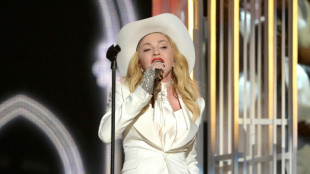 'Queen of Pop' Madonna lambasts 'King' Trump
'Queen of Pop' Madonna lambasts 'King' Trump
-
Apple says halting data protection tool for UK users

-
 Female chefs condemn sexism in British kitchens
Female chefs condemn sexism in British kitchens
-
US, China economic leaders raise 'serious concerns' in first call

-
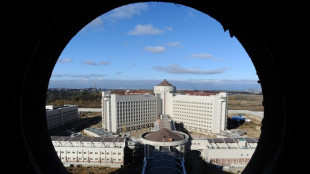 Russia sells famed imperial prison at auction
Russia sells famed imperial prison at auction
-
Stock markets rise as Alibaba fuels Hong Kong tech rally

-
 France full-back Jaminet returns to rugby after racist video ban
France full-back Jaminet returns to rugby after racist video ban
-
Chinese AI companies celebrate DeepSeek, shrug off global curbs
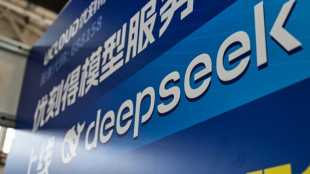
-
 Asian markets advance as Alibaba fuels Hong Kong tech rally
Asian markets advance as Alibaba fuels Hong Kong tech rally
-
Nissan shares jump 11% on reported plan to seek Tesla investment

-
 Trump aid cut imperils water scheme in scorching Pakistan city
Trump aid cut imperils water scheme in scorching Pakistan city
-
Just 17% of Japan citizens hold passport, data shows

-
 Most Asian markets rise as traders pick over week of headlines
Most Asian markets rise as traders pick over week of headlines
-
Japan's core inflation rate hits 19-month high

-
 How a 'forgotten' Minnesota monastery inspired 'The Brutalist'
How a 'forgotten' Minnesota monastery inspired 'The Brutalist'
-
Japan's core inflation rate hits 3.2% in January

-
 Stocks mostly fall on tepid Walmart outlook, geopolitical worries
Stocks mostly fall on tepid Walmart outlook, geopolitical worries
-
Musk in X spat with Danish astronaut over 'abandoned' ISS crew
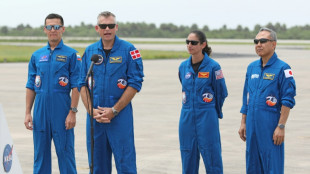
-
 Bond franchise shake-up moves spy into Amazon stable
Bond franchise shake-up moves spy into Amazon stable
-
New York seeks hundreds of millions of dollars in 'vaping epidemic' case

-
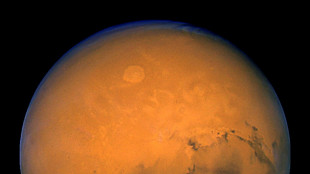 Moon or Mars? NASA's future at a crossroads under Trump
Moon or Mars? NASA's future at a crossroads under Trump
-
Spotify adds more AI-generated audiobooks

-
 Stocks in the red as investors worry about growth and inflation
Stocks in the red as investors worry about growth and inflation
-
Bond franchise shifts to Amazon as Broccoli family steps back

-
 Unfair? Figures belie Trump's claims on EU trade balance
Unfair? Figures belie Trump's claims on EU trade balance
-
Stock markets mostly lower on Fed concerns over Trump policies


Cuba runs out of milk, breaking Castro's promise
In the early days of communism in Cuba, Fidel Castro had pledged that every child under seven would have a liter of subsidized milk every day.
For some time, they did -- but today, many go without.
To circumvent the US embargo against Cuba and lagging domestic production, milk has to come from the other side of the world in an obstacle race that deprives many on the island of the staple.
Regla Caridad Zayas, a 59-year-old diabetic, said the milk powder that the Cuban state supplies monthly to her and others with special dietary needs dried up months ago.
She is supposed to get a kilo of powder, which makes 10 liters (2.6 gallons) of milk, every month.
Sitting at a rickety table from which she sells coffee outside her house, Zayas said the bodegas, or subsidized food stores, no longer carry the commodity.
In the supermarket, it is also nigh impossible to find: milk has become the latest casualty in a long history of chronic food shortages in Cuba, which on Monday marks six decades of US sanctions.
And it will continue to be in short supply in Havana and four other provinces, due to a lack of "financing, boats and suppliers," Internal Trade Minister Betsy Diaz said in October.
To find milk powder, Cuba looks all the way to New Zealand -- its main supplier with 18,470 tons in 2020 -- as well as Belgium (6,628 tons) and Uruguay (3,695 tons), according to specialized export and import data site Trade Map.
- Containers stuck -
Official Cuban data shows that the island produced 455 million kilograms of fresh milk in 2020, far short of what it needs.
According to the PanAmerican Dairy Federation, each person should have access to 150 liters of milk per year -- some 1.6 billion liters, and about the same in kilograms, for Cuba's 11.2 million inhabitants.
The cheapest and easiest would be to get the milk from the United States -- one of the world's largest exporters and less than 200 kilometers (124 miles) from Cuba's coastline.
Since 2000, food products have been excluded from the US embargo on trade with Havana. But Cuba must pay cash and in advance -- onerous conditions for a country in deep economic crisis, with little foreign exchange and no access to loans.
Getting products from the other side of the planet is not easy, either: more than 10,000 containers of food and other products were stuck last month in ports around the world due to pandemic supply chain issues, the government said.
For decades, revolutionary leader-turned-president Fidel Castro made a point of supplying cheap, subsidized milk to all children under the age of seven and people with chronic diseases.
His brother and successor Raul proposed in 2007 to go even further by "producing milk so that all those who want to drink a glass of milk can do it."
But today, even the guaranteed monthly ration of three kilos of powdered milk for children is running out. For other recipients such as Zayas, there is none.
- Milk was 'sacrosanct' -
"Truly, everything is disappearing," said Claudia Coronado, a 29-year-old mother of two children aged three and seven, while standing in one of Havana's ubiquitous food queues.
"We were used to not having chicken for a month, but milk, that was always sacrosanct."
"I have a daughter of eight, she's no longer getting milk," said Jenny Mora, 29, who said she often has no choice but to turn to the black market and pay exorbitant prices.
The store outside of which the two women are queuing only accepts foreign currency -- itself also only available on the parallel market.
A sachet of one kilogram (two pounds) of milk powder costs $6.30 -- a fortune in a country where the average monthly salary is $163.
Economist Omar Everleny Perez said that without government help, it was more profitable for farmers to sell their product on the black market.
- Lean cow, low yield -
Farmer Domingo Diaz, 79, blames the US embargo for "about 90 percent" of the milk shortage.
He blames the communist government for the rest.
Though it raised the purchase price to help producers, the government did nothing to secure access to cow feed, he said.
Undernourished, the animals produce very little.
"The milk problem affects everyone, it drives me mad, too," said Diaz, as he tried to squeeze milk from a lean beast.
C.Peyronnet--CPN
